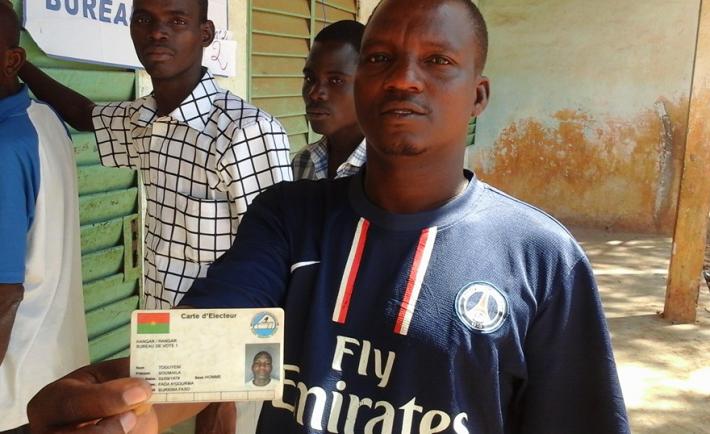
A voter in Burkina Faso displays his ID card. Many observers have described the recent election as ‟the freest and fairest" in the country’s history.
In the past week, the people of Burkina Faso again surprised many Africa watchers – the third time in 15 months – by holding what many observers have described as ‟the freest and fairest" elections in the country’s history. The first surprise came in October 2014, when a largely peaceful and highly coordinated citizen revolt over constitutional term limits led to the ouster of former military officer - turned Head of State Blaise Compaore, putting an end to his 27 years rule and strong grip on political power. As Compaore fled the country, a transition government was installed to run the state and conduct presidential and legislative elections within one year. A few weeks before those elections, initially scheduled for October 11, renegade troops from Compaore’s president guard stormed the state house and staged a coup to forestall the transition process. Fortunately, the population took to the streets again and, under the leadership of various civil society organizations, labor unions, opposition political parties, and the rest of the military, squashed the coup. As the country finally went to the polls on November 29, there was considerable anxiety and uncertainty about how successful the polls would be, and whether the contestants and their supporters would all accept the outcome.
Four days after election day, Burkinabes continue to take pride in their accomplishments, and for good reason: the Independent Election Commission (CENI) administered the polls in a very transparent and professional manner, and used new technology to transmit, process and announce election results within 24 hours; poll workers were well trained and hence very knowledgeable of voting procedures; voters turned out in fairly high numbers, waited patiently in sometimes long lines, and cast their ballots peacefully; political parties and candidates had poll watchers in polling stations; and civil society organizations deployed thousands of citizen observers across the country to monitor the polls, with one coalition – CODEL – conducting a parallel vote tabulation (PVT) to collect and transmit data on various phases of the elections in real time and later verify the accuracy of the official results announced by the CENI. Upon the CENI’s announcement of provisional results for the presidential race, the second place candidate – Zephirin Diabre of the UPC - tweeted a statement conceding defeat, and then visited the campaign headquarters of the declared winner – Roch Marc Kabore of the MPP - to congratulate him.
Results of the legislative polls were announced last night, and do track party performance in the presidential polls as the leading party – the MPP – won 55 seats while the UPC won 33 seats and the former ruling party, the CDP, won 18 seats. The National Assembly has 127 seats, and so the MPP is going to have to build alliances with other parties in the Assembly to obtain a parliamentary majority. We also expect there will be at least three parliamentary groups (or caucuses) in the new legislature. This bodes well for the legislature which many Burkinabes expect will assert itself as a co-equal branch of government, better represent citizen interests, and exercise proper oversight over the executive branch.
In the next few years, Burkina Faso may still face some challenges grappling with governance issues. These include transitional justice matters pertaining to criminal acts committed by members of the Compoare regime, constitutional reforms to further consolidate and safeguard the country’s nascent democracy, legislative strengthening for members of the new National Assembly, security sector reform, youth unemployment, and meeting high expectations and citizen needs in the social sectors such as education, health, and infrastructure development. Given Burkina Faso’s geographic location in the Sahel, the country will also be exposed to other vulnerabilities such as potential terrorist attacks by jihadist extremists, and food security. Fortunately, the country now has a duly elected and therefore legitimate government, a politically active citizenry that is determined to hold its leaders accountable and, hopefully, political leaders who now appreciate the valuable contribution that civil society and other tenets of democracy can bring to the governance process. During my one week stay in Ouagadougou, I and my colleagues here discussed these issues extensively with our Burkinabe partners, including President-elect Kabore and second place candidate Diabre who is now set to play the role of main opposition leader. Both leaders are very conversant, and expressed appreciation for NDI’s programs in the country over the past decade. They both pledged to continue to engage with our in-country team going forward.
Our efforts would not have been possible without the support of USAID, Swiss Cooperation, SIDA, Danida, and the Taiwanese representation. Burkina Faso Senior Resident Director Aminata Kasse, Program Director Dany Ayida and the rest of our colleagues in the Burkina Faso office as well as the country team in DC carried out effective and impactful projects, and built strong and enduring relations with extraordinary civic and political partners.
